If, as orthodoxy says, a belief in the deity of Christ and the doctrine of the Trinity is necessary for salvation, we would expect it to be in the book that chronicles the spread of the gospel in the early Church. For example, what did Luke record in the book of Acts regarding Peter’s Christology? Did the foremost among the twelve apostles preach that Jesus is God? His sermon before the Sanhedrin provides us with the answer.
In Acts chapter 3, Peter and John encountered a lame man asking for alms at the Beautiful Gate. Instead of giving him alms, Peter healed the lame man in the “name of Jesus Christ of Nazareth.” When the crowd saw the lame man walking and leaping and praising God, they ran to Peter and John in amazement. Peter took the opportunity to tell the crowd that Jesus is the Christ of God, whom they had crucified, but whom God had raised from the dead. Furthermore, he referred to Jesus as the servant of God, sent to bless them by turning them from their wicked ways. Therefore, they should repent and return to God. But at no time does Peter indicate that Jesus is deity or that he preexisted in heaven, or that God is a triune being.
Chapter 4 of Acts continues the account. As Peter and John were speaking to the people, the priests, the captain of the temple guard, and the Sadducees came up to them, greatly disturbed. What was it that the apostles had been teaching that stirred the ire of the Jewish leaders? Luke explains:
Acts 4:1-3 (NASB) As they were speaking to the people, the priests and the captain of the temple guard and the Sadducees came up to them, 2 being greatly disturbed because they were teaching the people and proclaiming in Jesus the resurrection from the dead. 3 And they laid hands on them and put them in jail until the next day, for it was already evening. (emphasis added)
The governing authorities arrested Peter and John because they had been preaching that the dead in Jesus will be raised to new life. The Sadducees did not believe in the resurrection of the dead, so this would have been offensive to them. But there were far more who heard the message and believed than those who heard and took offense:
Acts 4:4 (NASB) But many of those who had heard the message believed; and the number of the men came to be about five thousand. (emphasis added)
What did this multitude believe about Jesus? That he was God-incarnate? Or the second member of the Trinity? Or that you have to believe he is God in order to be saved? No, rather, they believed the message that Peter had been preaching in Acts 3: the man from Nazareth was the Messiah of God, not that he was God-the-Messiah.
If Peter and John had taught that Jesus was God, along with the Father, the fiercely monotheistic Jews would have arrested them for that instead, and charged them with blasphemy. Such a teaching would have been much more grievous than a teaching on the resurrection.
Why didn’t Peter tell the crowd that Jesus was God or that the Holy Spirit was God, too, for that matter? Perhaps Peter was saving the revelation of Jesus’ deity for a more influential audience. If that was the case, he was about to get his opportunity.
On Trial Before the Sanhedrin.
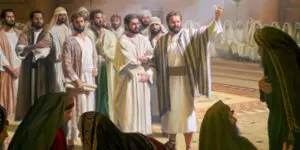
The next day, when the apostles stood trial before the Sanhedrin,[1] they were asked by what authority they had healed the lame man. It’s one thing to preach a message, but quite another to validate it with signs and wonders:
Acts 4:7-12 (NASB) When they had placed them in the center, they began to inquire, “By what power, or in what name, have you done this?” 8 Then Peter, filled with the Holy Spirit, said to them, “Rulers and elders of the people, 9 if we are on trial today for a benefit done to a sick man, as to how this man has been made well, 10 let it be known to all of you and to all the people of Israel, that by the name of Jesus Christ the Nazarene, whom you crucified, whom God raised from the dead—by this name this man stands here before you in good health. 11 “He is the STONE WHICH WAS REJECTED by you, THE BUILDERS, but WHICH BECAME THE CHIEF CORNER stone. 12 “And there is salvation in no one else; for there is no other name under heaven that has been given among men by which we must be saved.” (emphasis added)
It would seem that this opportunity to preach the gospel to the Jewish leaders was ordained. Indeed, Jesus had prophesied this would happen:
Luke 12:11-12 (NASB) “When they bring you before the synagogues and the rulers and the authorities, do not worry about how or what you are to speak in your defense, or what you are to say; 12 for the Holy Spirit will teach you in that very hour what you ought to say.”
True to Jesus’ words, Peter did not speak a message of his own making, but was filled with the Holy Spirit. The question is, what would Peter be led to say? If there was ever a time for God to reveal that He was not one–in the sense that the Jews had understood Him to be for millennia–but a tri-personal being, this was it. But Peter makes no mention of the Trinity or of Jesus’ supposed deity. Instead, he preaches a message consistent with his previous sermons and the revelation God had given him.[2] That Jesus, the man from Nazareth, is the Christ whom they crucified but whom God raised from the dead and made the chief cornerstone.
The Chief Cornerstone
The chief cornerstone was an architectural term referring to the first stone laid in a building. It was an integral part of the structure, as its positioning would determine the soundness of the structure since all subsequent stones would be placed following the standard set by the chief cornerstone. Peter elaborates on this theme and its spiritual application in his first epistle.
1 Peter 2:4-8 (NASB) And coming to Him [Jesus] as to a living stone which has been rejected by men, but is choice and precious in the sight of God, 5 you also, as living stones, are being built up as a spiritual house for a holy priesthood, to offer up spiritual sacrifices acceptable to God through Jesus Christ. 6 For this is contained in Scripture: “BEHOLD, I LAY IN ZION A CHOICE STONE, A PRECIOUS CORNER stone, AND HE WHO BELIEVES IN HIM WILL NOT BE DISAPPOINTED.” 7 This precious value, then, is for you who believe; but for those who disbelieve, “THE STONE WHICH THE BUILDERS REJECTED, THIS BECAME THE VERY CORNER stone,” 8 and, “A STONE OF STUMBLING AND A ROCK OF OFFENSE”; for they stumble because they are disobedient to the word, and to this doom they were also appointed. (emphasis added)
To be sure, Jesus was the first living stone to be laid in the spiritual temple dedicated to God. All those who believe in him are added as living stones to this spiritual house so that together we might offer spiritual sacrifices. Notice that our sacrifices are not offered to God and Jesus, but to God through Jesus, who is the Christ. The temple is not for Jesus, rather he is the chief stone among the other stones, i.e. the believers, that comprise the temple that is for God. This is Peter’s point before the Sanhedrin. The only way to come to God is through the chief cornerstone, that is, Jesus the Messiah:
Acts 4:12 (NASB) “And there is salvation in no one else; for there is no other name under heaven that has been given among men by which we must be saved.” (emphasis added)
The Sanhedrin had rejected Jesus, the only one authorized by God to grant access to God and eternal life in the kingdom. God hadn’t chosen the patriarchs, the prophets or the members of the Sanhedrin to be the chief cornerstone of the spiritual temple. Rather, it was this Jesus, the man from Nazareth.
How tragic that Church councils chiseled the chief cornerstone to fit a fourth century, philosophical conception of Jesus. Instead of him being the humble servant of God, as Peter had preached, he was recast as being “very God of very God,”[3] something Scripture never teaches. Sadly, post-Biblical tradition has replaced the cornerstone of the Messiah with the cornerstone of Jesus’ deity and the doctrine of the Trinity and declared you cannot be saved without it.
Jesus’ Authority is From God
It’s important to note that this name or authority that Jesus possesses isn’t inherently his. Instead, it was given or delegated to him. At least ten times we are told, many of which by Jesus himself, that Jesus is a man under the authority of God the Father.[4] It should not surprise us that Peter speaks of this in his first epistle:
1 Peter 1:3 and 3:22 (NASB) 3 Blessed be the God and Father of our Lord Jesus Christ…22 who is at the right hand of God, having gone into heaven, after angels and authorities and powers had been subjected to Him. (emphasis added)
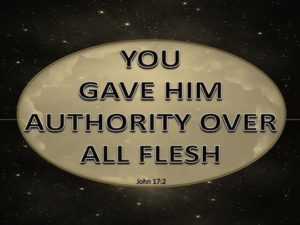 Not only does Jesus have a Father, he also has a God. This God subjugated angels, authorities, and powers to Jesus, who is the Christ. If Jesus is God, he cannot have a God as this would defy the very definition of God. Moreover, he would not require God to subjugate all things to him as they would intrinsically be subjected to him.
Not only does Jesus have a Father, he also has a God. This God subjugated angels, authorities, and powers to Jesus, who is the Christ. If Jesus is God, he cannot have a God as this would defy the very definition of God. Moreover, he would not require God to subjugate all things to him as they would intrinsically be subjected to him.
Lest we question the veracity of Peter’s message, let it be known that Jesus offered the same testimony:
John 17:1-3 (NASB) Jesus spoke these things; and lifting up His eyes to heaven, He said, “Father, the hour has come; glorify Your Son, that the Son may glorify You, 2 even as You gave Him authority over all flesh, that to all whom You have given Him, He may give eternal life. 3 “This is eternal life, that they may know You, the only true God, and Jesus Christ whom You have sent. (emphasis added)
Both Jesus and Peter, indeed all of Scripture, testify that the Father is the only true God, while Jesus is the Christ who was given authority to rule and reign in subjection to God.[5]
The Council’s Threat and Peter’s Response
After Peter preached that Jesus is the resurrected Christ, the Council conferred privately as to what they should do:
Acts 4:16-22 (NASB) saying, “What shall we do with these men? For the fact that a noteworthy miracle has taken place through them is apparent to all who live in Jerusalem, and we cannot deny it. 17 “But so that it will not spread any further among the people, let us warn them to speak no longer to any man in this name.” 18 And when they had summoned them, they commanded them not to speak or teach at all in the name of Jesus. 19 But Peter and John answered and said to them, “Whether it is right in the sight of God to give heed to you rather than to God, you be the judge; 20 for we cannot stop speaking about what we have seen and heard.” 21 When they had threatened them further, they let them go (finding no basis on which to punish them) on account of the people, because they were all glorifying God for what had happened; 22 for the man was more than forty years old on whom this miracle of healing had been performed. (emphasis added)
What was it that the Jewish governing authorities were concerned might spread? A new teaching that Jesus is God-incarnate? No, for there had been absolutely no teaching regarding Jesus’ having a supposed dual nature, a teaching that would not be fully evolve until the fourth century. Rather, they were concerned that the apostles would keep preaching that Jesus was the resurrected Christ.
After Peter and John were released by the Sanhedrin, they gathered with fellow believers and reported what had happened. Then they lifted up their voices and prayed:
Acts 4:23-31 (NASB) When they had been released, they went to their own companions and reported all that the chief priests and the
elders had said to them. 24 And when they heard this, they lifted their voices to God with one accord and said, “O Lord, it is You who MADE THE HEAVEN AND THE EARTH AND THE SEA, AND ALL THAT IS IN THEM, 25 who by the Holy Spirit, through the mouth of our father David Your servant, said, ‘WHY DID THE GENTILES RAGE, AND THE PEOPLES DEVISE FUTILE THINGS? 26 ‘THE KINGS OF THE EARTH TOOK THEIR STAND, AND THE RULERS WERE GATHERED TOGETHER AGAINST THE LORD AND AGAINST HIS CHRIST.’ 27 “For truly in this city there were gathered together against Your holy servant Jesus, whom You anointed, both Herod and Pontius Pilate, along with the Gentiles and the peoples of Israel, 28 to do whatever Your hand and Your purpose predestined to occur. 29 “And now, Lord, take note of their threats, and grant that Your bond-servants may speak Your word with all confidence, 30 while You extend Your hand to heal, and signs and wonders take place through the name of Your holy servant Jesus.” 31 And when they had prayed, the place where they had gathered together was shaken, and they were all filled with the Holy Spirit and began to speak the word of God with boldness. (emphasis added)
It’s important to point out that the believers distinguished between God, who is the Creator, and Jesus, whom they twice referred to as the holy servant of God. What’s more, they petitioned God to extend His hand to heal and perform miracles through the name of His holy servant, Jesus. They understood what many Christians today do not. Which is, that Jesus did not perform miracles because he is God, but because God was working through him. This is exactly what Peter preached on the Day of Pentecost:
Acts 2:22 (NASB) “Men of Israel, listen to these words: Jesus the Nazarene, a man attested to you by God with miracles and wonders and signs which God performed through Him in your midst, just as you yourselves know— (emphasis added)
How did God respond to their prayer? He answered it with power, for the place where they were meeting was shaken, and they were all filled with the Spirit and began to speak the word of God with boldness! What was the message that these Spirit-filled Christians boldly shared? No doubt, it was the same message they had heard from Peter and had believed.[6] And, unlike today’s sermons, it did not include one word of Jesus’ supposed deity or a belief in a triune God. Isn’t it time we began preaching the same message that Peter preached?
[1] Although the text does not refer to this gathering of elders, rulers, and chief priests as the Sanhedrin, per se, scholars agree this was a meeting of the rabbinic judicial and administrative court. See Acts 4:19 where Luke refers to this gathering as “the Council.”
[2] Matthew 16:13-17.
[3] A phrase from the Nicene Creed, https://www.creeds.net/ancient/nicene.htm
[4] Matthew 9:6 and 8; 11:27; 28:18; John 3:35; 5:26-27; 13:3-4; 17:1-3; Ephesians 1:17 and 20-22; 1 Peter 1:3 and 3:22; Revelation 2:27.
[5] 1 Corinthians 15:25-28.
[6] Acts 4:4.
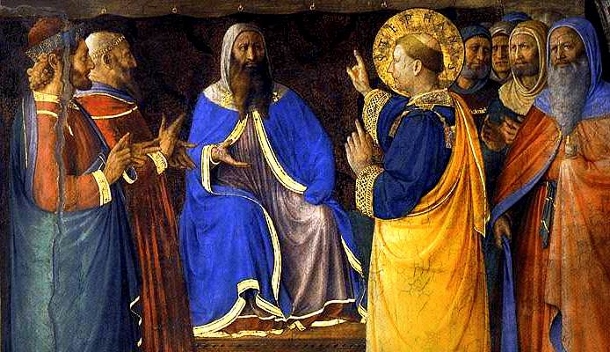
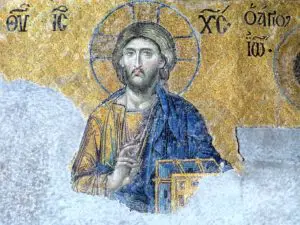
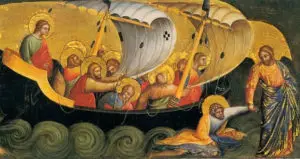

Another good article – clear and precise. Thanks
Thank you, Chuck! I appreciate you!
Nailed it. Peter (and Luke) are so clear and easy to understand. It boggles me that the evangelical world often turns new believers to John, and not to Acts (or Genesis!).
Hi Luke,
Thanks for reading the article and commenting. When your eyes are opened, what was once obscured by tradition can now be clearly seen.
God bless!